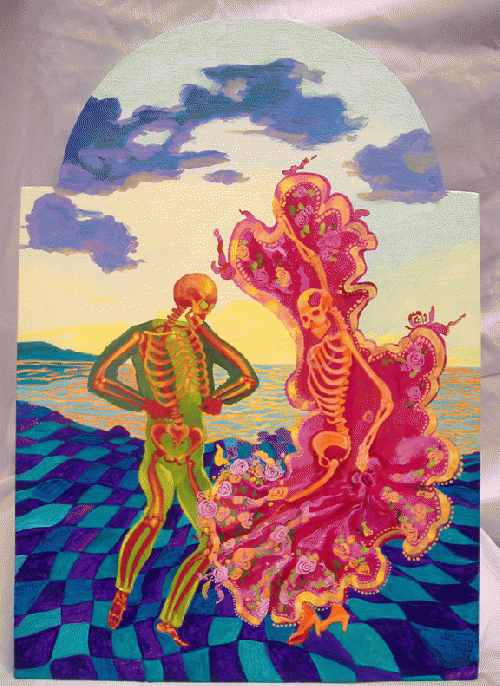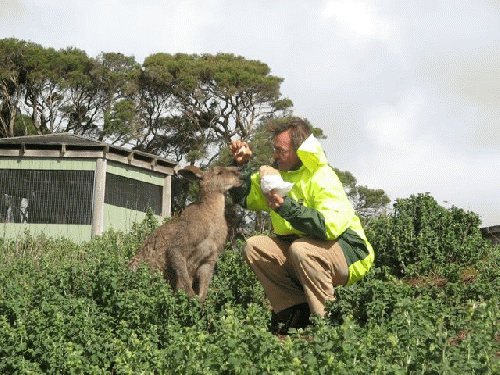|
Lewis Mehl-Madrona: Suicide Prevention -- Does it Work?
Are psychiatric services successful in preventing suicide or do we actually cause more suicides than would otherwise happen. We create a culture of helplessness in which people expect rescue and do not believe they are in control of their actions. They can attempt suicide thinking they will be saved, but can miscalculate and accidentally die. An Australian man stopped 160 suicides by giving people breakfast. Is this better? 1 |
 Lewis Mehl-Madrona: Working to Recover, or Adjusting to Illness? Existing research is pessimistic about the value of our currently dominant biomedical paradigm for treating mental illness. Long-term antipsychotic use appears to make people worse rather than better. While the research continues to accumulate, practice does not change. Doctors continue to practice as if psychosis comes from lack of medication. People recover without medications. How do we reconcile these two models? 1 |
 Vijayaraghavan Padmanabhan: Becoming Aware of Mind-Body-Spirit Medicine The development from Era 1 to Era 2 medicine emphasizes that we are not the body alone; we are mind-body entities. Era 3 medicine indicates that we are not confined to our mind-body; we are mind-body-spirit entities. As is the belief, so is the practice. If the physician believed that he was a mind-body-spirit entity, he would suggest the attitude of 'prayerfulness' by those concerned with the patient. 1 |
|
Lewis Mehl-Madrona: Avatars and Hearing Voices Therapy
Recently we've learned about a computer assisted process for dialogue with disembodied, persecutory voices. In this process, developed by Dr. Julian Leff, a psychiatrist at University College, London, voice hearers pick a sound for their voice and a face which becomes an avatar on the computer screen. Then the facilitator helps them to dialogue with the avatar to oppose it. The results are very impressive. 1 |
Lewis Mehl-Madrona: To Do and Not To Be
I reflect upon the importance of doing, what is called behavioral activation. In order to change, we need to do things differently, and not just think about doing things differently. Unfortunately, conventional medicine has supported a narrative which tells us that we do not have to make an effort to change our behavior, so people who are depressed or anxious don't believe they need to do anything. We need to change this. |
 Lewis Mehl-Madrona: Day 6 of Australia 2013: Hearing Voices 1 Day 6 finds us in Melbourne and back from the bush. I include some pictures from the bush. In Melbourne we are doing a presentation with the Hearing Voices Group of Victoria about indigenous approaches to voices. We started the day by explaining our approach to voices which is to give them full ontological status and dialoging with them to learn why they have come and what they want. We did experiential exercises after. |
|
Lewis Mehl-Madrona: Day 14 of the Australian Journey 2012
Today is the end of the Australian cross cultural adventure. I fly back to the U.S. today and resume ordinary life. I write about the people I met whom I appreciate and what I learned and where we might go next. |
Lewis Mehl-Madrona: Day 13 of the Australian Journey 2012
Today is Day 13 of the Australian Cultural Exchange Journey for 2012. After a quick morning run, we went to Mission Australia's Youth Forum 2012. We met Nancy Ingram, an elder from the area who attended Harvard University and knew about Vermont. I have a talk about the importance of heroism for adolescents and finding ways for them to be heroic or to save face when they feel they have not been heroic. |
Lewis Mehl-Madrona: Day 12 of the Australian Journey
Day 12 of the Australian cross cultural exchange journey consisted in our leading an inipi ceremony (sweat lodge) for people associated with Mission Australia. We also learned much about some very exciting projects being conducted by Mission Australia, including the Michael Project, which is an intensive effort to assist homeless people in Sydney, and the Catalyst-Clemente Project, which provides education for disadvantaged. |
|
Lewis Mehl-Madrona: Day 11 of the Australian Journey 2012
Today is Day 11 of the Australian cultural exchange adventure for 2012. We interacted with Mission Australia in Sydney and were deeply impressed with their services for young people and for homeless adults. They have managed to integrate shelter with education and skills training so that homeless people become able to transition into the work force. One person told us, "I came here a prostitute, and I left an artist." |
Lewis Mehl-Madrona: Day 10 of the Australian Journey 2012
Today was Day 10 of the journey and was a day for reflection and preparation for the Sydney portion of our trip. We reflected upon what culture camp had meant for people and confirmed that we would come again next year. Then we flew to Sydney and ate a marvelous fish dinner. |
Lewis Mehl-Madrona: Day 9 of the Australian Journey 2012
Today is Day 9 of the Australian Cultural Exchange Journey for 2012. Related to the constant, driving rain, we mostly talked today We talked about the health care system to which we wished to move and how to get there, especially through changing the socialization of students and giving them new stories about what to expect from others. |
|
Lewis Mehl-Madrona: Day 8 of the Australian Journey 2012
This is Day 8 of the Australian cross cultural adventure. Today we went to the heart of the community where the elders from the Northern Territories demonstrated some of their ceremonies and procedures to the community. That included the burning ceremony for healing pain, the smoking ceremony for purification, and spear throwing. On the way back to the island, I interviewed a patient advocate from Western Australia. |
Lewis Mehl-Madrona: Day 7 of the Australian Journey 2012
Today is Day 7 of the Australian journey 2012. We are on Boole Poole in the Lake District of Gippsland. Our sweat lodge ceremony had been rained out the day before, so we prepared to do the ceremony as soon as the rain stopped which happened around 8am. I've written about sweat lodge before, as have others, most notably Bucko, author of The Lakota Sweat Lodge. It was a wonderful experience and then we hear crocodile tales. |
Lewis Mehl-Madrona: Day 6 of the Australian Journey 2012
Today is Day 6 of the 2012 Cultural Exchange Adventure in Australia. It was also the first day of culture camp at Boole Poole with the aboriginal coop. The driving rain prevented our crew from Northern Australia from doing much outside. We had planned a sweat lodge ceremony but that was cancelled also due to the rain. So instead, while we tried to stay dry, I interviewed the new doctor at the Coop. |
|
Lewis Mehl-Madrona: Day 5 of the Australian Journey 2012
I describe the fifth day of our journey for cross-cultural exchange. Today was primarily a day of our teaching. The days vary from receiving mostly to giving mostly. We focused on the importance for everyone, regardless of ethnicity or indigenous status to participate in ceremony in such a way as to feel closer to the spiritual dimension and to celebrate what's good and positive about one's life instead of tales of misdeeds. |
Lewis Mehl-Madrona: Day 1: Australia 2012
This article begins my 2012 Australian journey. I briefly describe my presentation for the day and then go to the meat of what I learned, which is about aboriginal health and disparity statistics in Australia today. Generally, as anyone can imagine, aboriginal people are in terrible shape in Australia -- to my surprise, worse than their counterparts in the USA and Canada. We know the sad state of Indians in the US. |
Lewis Mehl-Madrona: On the Nature of Afflictions
In this article I wonder about what illness has to offer us. What is the nature of affliction. Is it a thing or is it a doorway, an invitation to make meaning. All illnesses offer us this opportunity. |
 Brad Worthley: Add Is Not A Disease, It Is A Gift - If You Don't Have It You Should Get It! ADD & ADHD are perceived and treated as a disease, but there a many gifts behind the diagnoses. The gift of creativity, inginuity and fearlessness, which is why people with ADD & ADHD make great entrepreneurs. I have embraced the diagnoses and lived an extraordinary life because of it. 1 |
Lewis Mehl-Madrona: Accountability
This essay is about accountability. In the community mental health center where I have been working, most of the patients lack any sense of self-agency or accountability. Most see themselves as helpless victims of diseases over which they have no influence. They expect me to provide them with a drug that will regulate their moods and emotions and make them feel normal again. What does it take to restore a sense of agency? 1 |
Lewis Mehl-Madrona: Thoughts after Sundance 2011
I reflect upon Sundance 2011 and what I have learned. I realize that Sundance is about love and compassion and following this red road that leads to these directions. Sundance gives us an opportunity to rise to become spiritual warriors, to find all the benefits and none of the detriments of battle, to create a community of fellow warriors within which we can feel strong, and to transcend our natural limits to become more. 1 |
|
Lewis Mehl-Madrona: Narrative and Science: Day 13 of the Australian Journey
Today was our last full day in Australia and the occasion for a lecture and series of discussions at the University of Melbourne's Center for International Mental Health and School of Population Health. We explored the bridges between science and the indigenous world view of narrative. Particularly we were impressed with how neuroscience is completely supporting indigenous knowledge about narrative and its importance! |
Lewis Mehl-Madrona: Beyond Narrative Therapy: Day 11 of the Australian Journey
On Day 11, we engaged in dialogue about the narrative therapy of Michael White, which is what most people in Australia and the United States index, when we say narrative practices, and the narrative practices of indigenous people. While we deeply respect Michael White's contributions to psychology and humanity, we present him as one branch on a tree of narrative in which indigenous people live in the trunk and the roots. 1 |
Lewis Mehl-Madrona: Narrativizing is the first step at becoming indigenous friendly -- Day 8
On Day 8, we asked how do we transform health care to become more indigenous friendly, whether it's mental health care of general medical care. The answer that jumped out was to implement narrative practice. Indigenous cultures are virtually uniformly cultures of story in which stories matter greatly. Being heard means having the opportunity to tell one's stories. "Treatment" begins by hearing and acknowledging stories. 1 |
|
Lewis Mehl-Madrona: More Indigenous Similarities Despite Differences -- Day 6 of the Australian Journey
This is Day 6 of the Australian cross-cultural mental health exchange journey. Today we all experienced a form of healing used in the Northern Territories called "burning". They correct usage appears to be, "I burned her and she got well." One doesn't actually get burned, but palm bark is ceremonially placed in the area of an injury or sickness after having been made warm in a fire, accompanied by touch therapy and prayer. 1 |
Lewis Mehl-Madrona: Indigenous People are more Similar than Different -- Day 5 of the Australian Journey
Today is Day 5 of our Australian cross-cultural mental health adventure. We traveled from Melbourne to an aboriginal owned island which has ancient sites and is in the Gippsland Lakes. The take home message for the day came from a Gunnai-Kurnai aboriginal man at the end of the day, who said, "Indigenous people are more similar all over the world than they are different." He had the final word for the day, which is so true. 1 |
Lewis Mehl-Madrona: Imaging and doing are not as different as they sound
Contemporary neuroscience has shown us that imagining an act and performing an act are virtually the same. We can strength our muscles almost as much by imagining exercising as by exercising. If mind is so powerful, why aren't we harnessing it for the good. I fear that mostly we allow it to run for the bad, imagining ourselves in any number of dire straights and illnesses, instead of imagining ourselves hale as we should. 1 |
|
Lewis Mehl-Madrona: Rescue: When is it Unethical?
An under explored ethical area is that of what Michael Ortiz Hill, in his marvelous new book, The Craft of Compassion, has called professional narcissism. This is when we need our clients to get well for our own needs. Of course, we want to think that we are effective and can help people, but the more we think this way and the less we think of dialogical resolution where each contributes to the outcome, the more harm we do. 1 |
Lewis Mehl-Madrona: What we can learn from Tucson and why not to overreact!
The recent tragedy in Tucson has led some commentators to demand more inpatient beds, easier commitment laws, and forced treatment with medication. I argue that none of this would have stopped Mr. Loughner, since he had not come to anyone's attention yet. We need to refrain from overreacting and further stigmatizing the mentally ill, who are, by and large, not violent, and we need to think about ways to reach out more. 1 |
Lewis Mehl-Madrona: Hearing Voices and Seeing Visions: What to do?
Once upon a time, in most of the world's societies, hearing voices and seeing visions was honored and desired. In contemporary, modern culture it has become the one symptom that allows an immediate diagnosis of a psychotic disorder. In this essay, I write about the downside of pathologizing voices, while still acknowledging that many people suffer enormously from voices and negative visions. I describe how to be healing. 1 |

|
Articles For Tag "People" |
